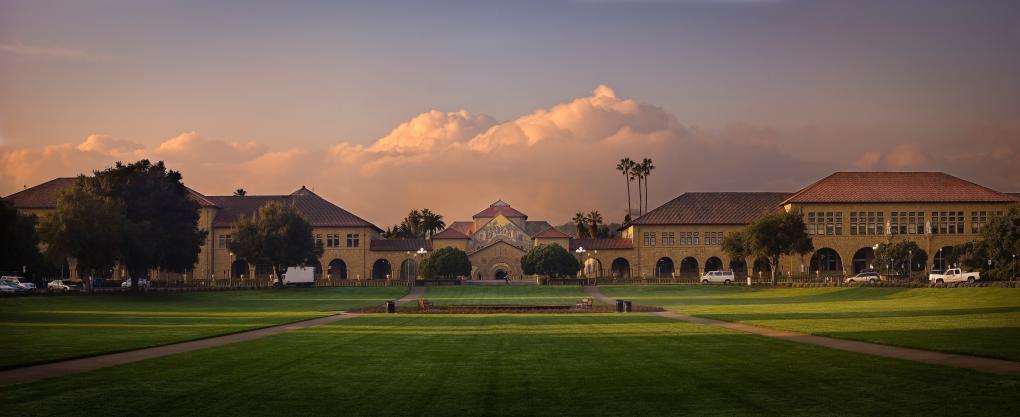AI for Good: The Promise and the Peril
Harnessing the Power of Stories
Shaping the Future with Lisa Kay Solomon
Summer Session I Speaker Series
About the Speaker Series
In Summer 2020, Stanford Summer Session hosted a series of speaker events featuring Stanford experts. Enjoy these recordings of last year's events, covering topics in a variety of fields. Learn more about the upcoming Summer 2021 Speaker Series that confirmed students will be invited to attend on our Events and Engagement website.
Creativity and Design
"What we, as design thinkers, have, is this creative confidence that, when given a difficult problem, we have a methodology that enables us to come up with a solution that nobody has before."
- David Kelley, founder of the Hasso Plattner Institute of Design, better known at Stanford as the d.School.
Innovation and Entrepreneurship
Company Founders and Inventors
Stanford faculty and alumni have founded many prominent companies including Google, Hewlett-Packard, Nike, Trader Joe's, Sun Microsystems, Wirpo, GAP, Firefox, PayPal, Yahoo!, and many more.
Computer Science and Engineering
Software Mini-Series Workshops
It becomes more important than ever before to feel comfortable using a range of statistical software. This summer we will be offering a Software Mini-Series, four days of workshops where students will be invited to discuss R, C++, MATLAB, and Python. Take one or come to all four! Enrolled students can learn more about these workshops and others on the SARC Canvas page.
Social Sciences and Humanities
AI For Good: The Promise and the Peril
Jeremy Weinstein, professor of Political Science at Stanford University, has worked at the highest levels of government. Between 2013 and 2015, Weinstein served as the Deputy to the U.S. Ambassador to the United Nations, and was a member of the National Security Council Deputies’ Committee—the sub-cabinet policy committee with primary responsibility for advising the National Security Council, the Cabinet, and the President on the full range of foreign policy issues, including global counterterrorism, nonproliferation, U.S. policy in the Middle East, the strategic rebalance to Asia, cyber threats, among a wide variety of other issues.
Plan to hear Professor Weinstein's talk, AI For Good: The Promise and the Peril, on Thursday, June 24 as a part of our 2021 Summer Speakers Series. Registration will be available to enrolled students on our Events and Engagement website.
Math, Data, and Natural Sciences
Artificial Intelligence in Space Exploration
Marco Pavone is an associate professor of Aeronautics and Astronautics at Stanford University. Before joining Stanford, he was a Research Technologist within the Robotics Section at the NASA Jet Propulsion Laboratory. His main research interests are in the development of methodologies for the analysis, design, and control of autonomous systems, with an emphasis on self-driving cars, autonomous aerospace vehicles, and future mobility systems.
Plan to hear Professor Pavone's talk, Artificial Intelligence in Space Exploration, on Friday, July 2 as a part of our 2021 Summer Speakers Series. Registration will be available to enrolled students on our Events and Engagement website.
Writing and Public Speaking
Artificial Intelligence, Activism, and Art
Michele Elam is the William Robertson Coe Professor of Humanities at Stanford University. Elam's books include Race, Work, and Desire in American Literature, 1860-1930 (Cambridge University Press, 2003), The Souls of Mixed Folk: Race, Politics, and Aesthetics in the New Millennium (Stanford University Press, 2011), and The Cambridge Companion to James Baldwin (Cambridge University Press, 2015). Elam has written articles on race and culture in African American Review, American Literature, Theatre Journal and Genre, as well as op-eds for CNN, Huffington Post, and Boston Review. “Making Race in the Age of AI,” her most recent book project, considers how the humanities and arts function as key crucibles through which to frame and address urgent social questions about equity in emergent technologies. She was awarded the 2018 Darwin T. Turner Award for Outstanding Scholarship by the African American Literature and Culture Society.
Plan to hear Professor Elam's talk, Artificial Intelligence, Activism, and Art, on Tuesday, July 6 as a part of our 2021 Summer Speakers Series. Registration will be available to enrolled students on our Events and Engagement website.
Stanford Digital Exhibits and Projects

Explore More About Stanford
In 2021, Stanford University will celebrate the 130th anniversary of its opening on October 1, 1891. Founded by Jane and Leland Stanford in honor of their son Leland Jr., Stanford today is a global leader in teaching, research and discovery.
The digital exhibits and projects shared here explore the origins of the university and the many ways it has had, and continues to have, a transformative impact around the world. Stanford 125, the 2016 celebration of the university's 125th anniversary, shares stories about Stanford breakthroughs and campus life. Timelines and other historic features highlight how the university’s teaching and learning enterprise, its campus and culture have changed through the decades. Delve into histories of activism, community, and scholarship with the digital exhibits Black @ Stanford, Women @ Stanford, and Computer Science @ Stanford or browse through the Stanford Historical Photograph Collection for images of campus over the years, including the aftermath of two major earthquakes.